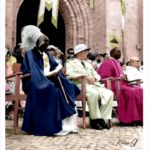Musinga and His Mother
Although the shadow of Rwabugiri must have loomed over Musinga’s early years, his development was far more closely guided by Kanjogera. She had had only one other child, a son who had died in infancy. If the relationship between them was like that in most Rwandan families, Musinga slept in his mother’s bed until he was about three years old and after that shared her house, sleeping behind a partition. Between the ages of ten and twelve, Tutsi boys ordinarily left their mothers’ homes for the residences of their fathers’ shebuja or batware. There they learned how to serve a patron and how to represent the interests of theirfathers. If chosen to participate in an itolero(the elite corps of a regiment), they would be further trained in military, political, and literary skills. Sons of bami were sometimes entrusted at this age to faithful servants or clients of the Court who were to provide for their security as well as their education. Musinga supposedly spent some time in the care of a Hutu client of Rwabugiri who lived in southern Rwanda. But by the time of Rwabugiri’s last campaign against Bushi, which was cut short by his sudden death, Musinga, then about twelve years old, had rejoined the Court and participated in the attack.
In Tutsi families the influence of the mother over her son often persisted even after he was thrust into the largely masculine world of the shebuja’s or mutware’s residence. Continuing maternal influence was accepted as understandable but not desirable in a society where a son’s interests were tied first and foremost to the lineage of his father. Such domination by a mother was known as ubukururamweko, “trailing a woman’s sash around after one’s self.” Among the Tutsi, the Bega women of the late nineteenth century were said to be domineering mothers. As one Rwandan concluded after giving numerous examples, “You may know a woman is a Mwega if it is she who commands in the household.” But even among the Bega, Kanjogera was renowned as an exceptionally overbearing woman, perhaps because she had the intelligence to arrive at the ends defined by her strong will. She was a handsome woman, tall and well-built, but by her nature, “she was more man than woman.”
Kanjogera began building her influence while Rwabugiri was still alive. After his death and her participation in the coup, she became the most powerful person in Rwanda. Although apparently unwilling or unable to act completely independently, she first controlled the balance of power between Kabare and Ruhinankiko and then awarded victory in the struggle to Kabare. Like the other Bega who had planned the coup, Kanjogera feared the day when her son might develop a sense of loyalty to his father’s lineage and would find the control of the Bega oppressive. Although bami theoretically could not reign without their mothers, many of them had found ways to limit or eliminate maternal influence. The implicit threat that Musinga might act independently once he became an adult made it all the more necessary for Kanjogera to control him closely when he was an adolescent. At the same time she knew thatshould Musinga die, she would find herself deprived of all wealth and position. Haunted by fear of reprisals —supernatural or otherwise—by the Banyiginya, Kanjogera sought to protect her son as much as herself from any possible harm. Afraid of attack at night, she insisted that her son continue to sleep in her quarters, although according to custom he should have had his own house as soon as he became an adult. Tormented by the fear that she or Musinga might be poisoned, she often refused the food or drink that had been prepared for them, sometimes making those responsible for it consume it on the spot to prove that it had been safe.
As Musinga became more mature, he increasingly resented Kanjogera’s domination. Much of the bitterness between them resulted from the coup. Musinga knew his position depended on the intrigues of his mother and her kin, not on a right he had inherited from his father. Kabare and Kanjogera constantly interfered with his attempts to renew contacts with his paternal relatives, banning some of his brothers from the Court. Kanjogera was said to have once reproached Musinga for not expelling the Europeans from Rwanda; the mwami retorted that since her kin had decimated the ranks of the Banyiginya, he had no more reliable warriors to assist him in such a struggle. Although Musinga sometimes privately maneuvered free of his mother’s control, he never publicly opposed her. Throughout his adult life, he continued to defer to her “like a child,” to accept her insults—she sometimes called him an imbecile—and even her blows without protest. The pattern of obedience established early had been established.
As the mwami, Musinga played the central role in the rituals that contributed so much to the awesome character of the Court. As one Father observed, the notables who were so arrogant and assertive when in their own domains became suddenly humble and obliging when face to face with their ruler at Court. After having completed the private religious ceremony that began each day, Musinga would appear wearing his beaded headdress and would take his seat at the entrance of his residence to receive the requests and complaints of his notables. Only the most favored notables were permitted to enter the inner courtyard before the residence of the mwami, while their entourages, sometimes numbering fifty or sixty clients each, waited in the public area outside the enclosure. When pleas had been made and cases heard, Musinga would announcethe decisions. Then the drums would roll and the assembled notables would applaud, indicating their submission to the royal will. As one participant recalled, the mwami would then put aside his headdress:
“one would say that today he is not going to kill us, that will be for tomorrow; this mwami is a good patron today; when he takes off his decorations, the animal is no longer the leopard, now he is our kinsmen, although there is always something of royalty which remains with him.”
Although Musinga alone had the role of spokesman and so symbolized the power of the Court, most Rwandans knew that his voice had not been the only or even the predominating one in the decisions. Kabare took his place among the other notables when cases were presented, while Kanjogera followed the arguments from behind a screen within the residence. They were the final arbiters in deciding how to use the traditional methods of execution, pillage, and reward to secure obedience from the notables and their subjects. As late as 1907 Kanjogera was stil remarking, “If the Tutsi do not obey us, we will kill them”; but the Court had been using such drastic measures less and less since Kabare’s assumption of power. They depended rather on revoking commands from those whom they distrusted, often subdividing the domains into even smaller units to reward a larger number of supporters. The Court had at its command more subtle means as well: it could demand increased taxes or gifts from those who lacked respect, or it could retain at Nyanza any notable who seemed inclined to disobey. In one case the Court permitted an offending notable to return home only after the men under his command had filled several enormous baskets with beads and a large storehouse with hoes. The time required for the tribute to be gathered allowed the notable’s rivals to gain strength in his region, while the requisitions necessary to meet the ransom ensured that he would lose support among his clients and subjects.
While Musinga participated in these exercises of power against those his mother and uncle feared, he could not use the same methods against those he himself wished most to attack. He might occasionally persuade Kanjogera and Kabare to pillage some unimportant notable whom they had previously favored, but he would never be able to push them to harm their own major clients. So long as Kanjogera and Kabare retained widespread support from the influential and wealthy, Musinga could not hope to rule independently.
For some time Musinga had realized the possibilities of using the Europeans to strengthen his position at Court. Although neither Ruhinankiko nor Kabare had shown any willingness to learn the skillsnecessary for ready communication with the foreigners, Musinga had begun to study Swahili in 1903 with a teacher provided by the Fathers. By early 1905 the mwami could converse easily in Swahili with the Europeans, the only person at Court able to do so.
Following the attacks on traders and clients of the Fathers in 1904, Musinga successfully divorced himself from the anti-European stance of Kabare and Kanjogera. After investigating the incidents, von Grawert reported to his superiors, “Musinga’s relation to the whole affair can only be described as praiseworthy.” Musinga’s first attempts to improve relations with the missionaries were cut short by his mother and her kin. When Musinga accepted gifts from the Fathers in November 1904, agreeing to consider their request for a new mission site, Kabare and his nephew Rwidegembya took the gifts and returned them to the Fathers while at the same time rejecting the request. Several months later, Kanjogera removed a Christian from his command, replacing him with one of her favorite servants. When the Fathers protested to Musinga that her action violated custom, Musinga did not argue the question of rights but merely replied with regret that although he might be mocked for his impotence, there was nothing he could do to change his mother’s decision.”
In July 11905 Musinga again tentatively explored the possibility of cooperating with the missionaries. He summoned a convert to Court to question him on the Fathers’ attitudes toward himself and the Court and on their future plans. Satisfied with the convert’s responses, Musinga promised the man a cow, thus accepting as client one of the inyangarwanda, the “repudiators of Rwanda,” who were still deeply scorned by Kanjogera, Kabare, and their followers. In August the Fathers sent two new teachers to Nyanza to teach more Swahili and reading and writing to Musinga and fifty children of his notables. Musinga obliged the missionaries by agreeing to provide porters for the timber needed to build the church at Save. The Fathers responded with gifts they thought suitable for a ruler: an armchair covered in velvet and “an artistic bed with mosquito netting, mattress and curtains.”
https://uk.amateka.net/musinga-and-his-mother/https://uk.amateka.net/wp-content/uploads/2021/03/monarchie.pnghttps://uk.amateka.net/wp-content/uploads/2021/03/monarchie-150x150.pngHistory of kingsAlthough the shadow of Rwabugiri must have loomed over Musinga's early years, his development was far more closely guided by Kanjogera. She had had only one other child, a son who had died in infancy. If the relationship between them was like that in most Rwandan families, Musinga slept...BarataBarata rpierre@ikaze.netAdministratorAMATEKA | HISTORY OF RWANDA




